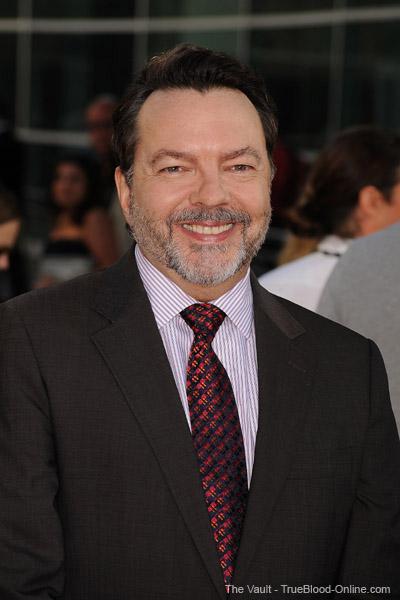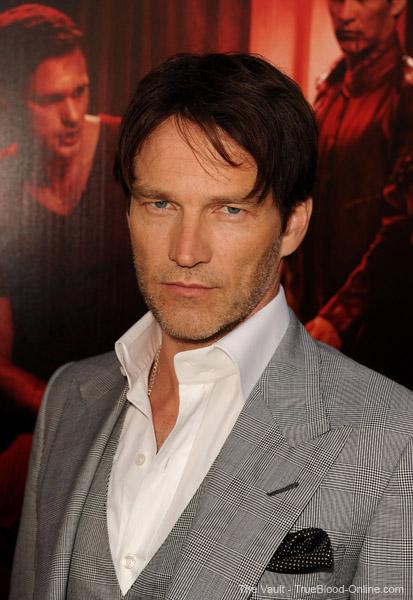 The art of storytelling is part of Alan Ball’s genius. From Six Feet Under to True Blood, writer-director Alan Ball has helped change how television tells stories. It’s either that or open a lost dogs’ home, the Oscar winner explains.
The art of storytelling is part of Alan Ball’s genius. From Six Feet Under to True Blood, writer-director Alan Ball has helped change how television tells stories. It’s either that or open a lost dogs’ home, the Oscar winner explains.
The sickness is back. Yet again, the vampires have sucked the life out of Alan Ball. ‘‘I just wrapped season four of True Blood and came down with some sort of serious fever,” Ball says. ”That always happens at the end of a season, where my body says, ‘Right, now you can afford to get sick.”’
The edgy vampire drama has sapped the strength from its creator for four years. But even as he coughs and shuffles around his Los Angeles home, Ball knows the sickness is a small price to pay. After three hit seasons, series four of the HBO program is attracting positive reviews and big ratings. The series, starring Anna Paquin seems unkillable.
More significantly, it has cemented Ball’s place as one of the age’s defining storytellers. After the film American Beauty and his previous HBO series, Six Feet Under, revealed his talent, True Blood has revealed his versatility. It was probably the last thing Ball’s fans expected. Fangbanging? Really? In an era when Twilight and The Vampire Diaries have made bloodsuckers mainstream?

‘‘Alan has never been a big vampire fan,” says Stephen Moyer, who plays the vampire Bill Compton in True Blood. ”It wasn’t something that informed his way of being but he just loved the book [series by Charlaine Harris]. He just saw a world within the book.”
Above all, he just likes a good story, no matter what it’s about. This is the beauty of Alan Ball: both his storylines and his career are eminently unpredicatable. In the film American Beauty (which he wrote), the story of a suburban midlife crisis culminates in the image of a plastic bag swirling on a breeze. In Six Feet Under (which he created and co-directed), the story of a family of undertakers opens with the patriarch dying in a car crash. In the film Towelhead (which he wrote, produced and directed), an Arab-American girl struggles with her identity and sexuality during the Gulf War.
Each one was rich and layered, and so is True Blood. It’s more than just a romance that revolves around Paquin’s part-fairy telepath and her immortal paramours, played by Moyer and Alexander Skarsgard as the viking vampire Eric Northman.
‘‘I think Alan’s very clever like that,” Moyer says. ”At the heart of it, I think it’s a really romantic love story [but that] doesn’t mean it can’t be 20 other things as well. I couldn’t believe it when I read the script. I couldn’t believe how much he’d packed into it.”
With his themes, plots and characters, Ball has helped to change the way stories are told on our screens. He favours depth with narratives that encourage long attention spans. And he’s done it mostly on the much-maligned medium of television.
Ball, who has made death a recurring theme in his work. As each season passes, Ball is even more convinced that’s true. In particular, the HBO cable channel – which spawned Six Feet Under and True Blood – fosters great writing, he says, unlike the traditional network model.
‘‘When you work on a channel like HBO that is not driven to be a platform for advertisements, then there is less of an impetus for a show to grab as many eyeballs as possible right out of the gate,” Ball says.
”It’s a different business model altogether. They rely on subscriptions, so the audience tends to be older. In America, the moviegoing audience is about 15 and they’re not particularly interested in stories that are ambiguous, nuanced and really force you to engage in characters who are flawed.
”And then you add to that the fact that if you’re working on a series, you actually have 12, 24 or 36 hours to tell a story, to really track a character or characters as they grow and change. So it doesn’t have to be that simplistic three-act – set-up, inciting incident, action builds, denouement – kind of movie, which is what most studio movies seem to aspire to be.”
Ironically, this comes from a man who wrote one of the most celebrated movies of modern times. On its release in 1999, American Beauty had limited prospects. It was directed by first-timer Sam Mendes and depicted repressed homosexuality, domestic violence and a middle-aged moper lusting after a teenage cheerleader. Nonetheless, it won five Oscars, including one for Ball’s screenplay.
He still doesn’t know why. ‘‘I think it was an anomaly,” he says. ‘‘I don’t think any of us who were working on that movie thought it would be anything other than a little art-house movie. But for whatever reason … it was charmed.’‘
It was a drama that revealed beauty in the unlikeliest places. And its central image of a plastic bag dancing on a breeze can be interpreted as Buddhist.
”I don’t know that I sat down to write that and thought, ‘How can I have a visual metaphor for Buddhism?”’ Ball says. ”In reality, I had had a personal experience with a plastic bag in front of the World Trade Centre, of all places. I was walking home from brunch on a Sunday that was pretty gray and there was this plastic bag that literally circled me 15 times. I remember feeling like I was in the presence of something profound and yet at the same time something incredibly mundane.”
Ball was not born into Buddhism. He was born into southern Methodism in Atlanta in 1957. He said grace before dinner and prayers before bed, and in the summer holidays he went to Bible school. When he was 13, his older sister died in a car crash on her 22nd birthday. Ball was in the car when it happened.
‘‘She died in front of me,” Ball has said. ”She died all over me. Death stuck its big, old, ugly face in my face and my life changed. That’s why death seems to be a theme that appears in all my stuff.”
The tragedy not only infused his work, it also led to a split from God and an openness to Eastern philosophies.
‘‘I was just sort of non-religious for many, many years. And as I stumbled onto Eastern philosophy and Buddhism, it was the first time I had ever read any sort of philosophy that really made a tremendous amount of sense. What I liked that was missing from my experience of Christianity growing up was a sort of acceptance, a sort of being OK with being imperfect and not focusing on the sin.”
Apart from its Eastern influences, American Beauty featured a cameo from death. In 2001, Ball returned with a television series that gave death the lead role. Six Feet Under was bracingly original: its themes included mental illness, self-harm and, above all, mortality.
”Death is a companion for all of us, whether we acknowledge it or not, whether we’re aware of it or not, and it’s not necessarily a terrible thing,” he says. ”There’s a line in one episode where somebody asks Nate [Peter Krause],
‘Why do people have to die?’ And he thinks about it and says, ‘To make life important.’ There is some truth in that.”
Television is often lambasted as a shallow medium but Ball says it’s a great place to ask big philosophical questions.
‘‘For me, it’s been a very good medium. I don’t think anybody would ever have paid me to write the movie version of Six Feet Under. People would be thinking, ‘Well, who the hell is going to watch that? We’re not going to put a bunch of marketing money into that.”’
On television, Ball says, writers can spread their wings. As for content, he foresees zombies as the next big trend. Maybe.
”We have a line in the last episode of True Blood this season where it’s Halloween and they’re all dressed up, and somebody goes, ‘I’m a zombie. Don’t you know zombies are the new vampires?’ I’ve heard zombies, I’ve heard angels. I don’t know. That’s one of the great things about it all, nobody knows. It’s just going to be one person who does something from a place of pure passion and that’s going to catch attention.”
For Moyer, what differentiates Ball from other writer-directors is a rare combination of vivid imagination and an openness to collaboration. That has had a galvanising effect on his cast and crew.
”He’s one of the most inclusive directors I’ve ever worked with,” Moyer says. ‘‘He [shoots it] the way he’s written it, then once you’ve got it down that way, he will completely flip it on its head and do the antithesis of what you’ve just played … Usually, somebody who’s written it himself wants it exactly how they see it in their head and they haven’t got the imagination to say, ‘Right, I’ve got that. Let’s see what they can bring to the table.’
Moyer’s praise is par for the course. In Hollywood, backslapping and flattery are the norm. What distinguishes Ball is the volume of praise, and the way actors fall over one another in the rush to his auditions.
”The cast and crew would walk over broken glass and hot coals to do anything for him,” says Moyer. ”You just want to be brilliant for him.”
to read the rest of this article, go to: smh.com.au
